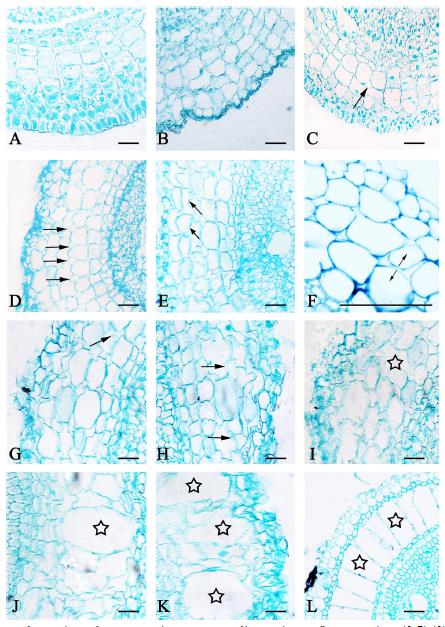近日,山地生态系统研究团队承担的国家自然科学基金项目围绕植物在低氧等逆境条件下的适应性机制开展了系列研究,揭示了植物生长、形态结构与信号调控等方面响应规律。研究发现,植物在水淹等低氧条件下,植物会根据氧气的缺乏程度呈现伸长生长或静默生长两种应对机制,同时,根茎叶的部分细胞感应胁迫信号发生细胞程序性死亡(programmed cell death, PCD)形成具有气体交换功能的空腔(通气组织);并进一步在细胞学和分子生物学水平揭示乙烯、活性氧和Caspase 3- like 蛋白等信号分子在植物胁迫下的调控作用,深入探讨了植物通气组织形成特点及其信号调控途径。在此领域发表的文章如下:
①Transcriptomic Analysis of the Photosynthetic, Respiration, and Aerenchyma Adaptation Strategies in Bermudagrass ( Cynodon dactylon) under Different Submergence Stress. International journal of molecular sciences, 2021,22(15):7905. https://doi.org/10.3390/ijms22157905
② Effects of different water conditions on the biomass, root morphology and aerenchyma formation in bermudagrass (Cynodon dactylon(L.) Pers). BMC Plant Biology, 2022, 22(1):266. https://doi.org/10.1186/s12870-022-03653-2
③Effects of ROS and caspase-3-like protein on the growth and aerenchyma formation of Potamogeton perfoliatus stem. Protoplasma,2022,(6) 1–19. https://doi.org/10.1007/s00709-022-01780-z
系列研究成果分别发表在International journal of molecular sciences(中科院二区top, IF=5.92), BMC Plant Biology(中科院二区, IF=4.21)和Protoplasma(中科院三区, IF=3.35)上,其中,第1和第2篇文章是与西南大学的合作成果,我院倪细炉副研究员为共同第一作者;第3篇文章以我院生态学硕士研究生谢沁宓为第一作者,倪细炉副研究员为通讯作者。这些工作得到国家自然科学基金项目(31960038, 31660045)的资助。
